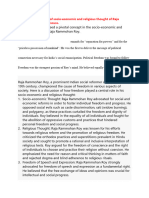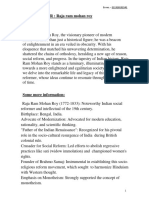Political Ideas of Raja Rammohan Roy
Political Ideas of Raja Rammohan Roy
Uploaded by
nilendumishra500Copyright:
Available Formats
Political Ideas of Raja Rammohan Roy
Political Ideas of Raja Rammohan Roy
Uploaded by
nilendumishra500Copyright
Available Formats
Share this document
Did you find this document useful?
Is this content inappropriate?
Copyright:
Available Formats
Political Ideas of Raja Rammohan Roy
Political Ideas of Raja Rammohan Roy
Uploaded by
nilendumishra500Copyright:
Available Formats
Raja Ram Mohan Roy's political ideas were deeply intertwined with his social and religious
reforms. He advocated for a blend of Western and Indian thought, seeking to modernize Indian
society while preserving its cultural heritage. Here are some of his key political ideas:
Social and Political Reforms:
● Abolition of Sati: Roy's most significant political achievement was the abolition of the
practice of sati (widow immolation) in 1829. He tirelessly campaigned against this
inhumane practice, arguing that it was against the principles of Hinduism and human
rights.
● Widow Remarriage: Roy strongly advocated for the right of widows to remarry,
challenging the traditional social norms that restricted their choices.
● Women's Education: He believed that women's education was essential for the progress
of society and actively promoted female literacy.
● Caste System: Roy opposed the rigid caste system, advocating for social equality and
the abolition of discriminatory practices.
● Monotheism: He promoted the idea of one God, drawing from Hindu, Islamic, and
Christian scriptures. This challenged the polytheistic beliefs prevalent in traditional
Hinduism.
Political Thought:
● Western Influence: Roy was influenced by Western ideas of democracy, individual rights,
and the rule of law. He believed that these principles could be adapted to the Indian
context to create a more just and equitable society.
● Indian Nationalism: While not an ardent nationalist, Roy's ideas contributed to the
development of Indian nationalism. He advocated for the rights of Indians and challenged
British colonial policies.
● Freedom of Press: He was a strong advocate for freedom of the press, founding several
newspapers and journals to express his views and promote social reforms.
● Education: Roy believed that education was essential for the progress of India. He
founded several educational institutions, including the Hindu College, to provide modern
education to Indians.
Legacy:
Raja Ram Mohan Roy's political ideas had a profound impact on Indian society and the Indian
independence movement. He is often referred to as the "Father of Modern India" for his role in
social and political reforms. His legacy continues to inspire generations of Indians to strive for a
just, equitable, and progressive society.
You might also like
- Raja Ram Mohan RoyDocument10 pagesRaja Ram Mohan Royshriyam mishraNo ratings yet
- BPSC 114 Eng 2024Document15 pagesBPSC 114 Eng 2024IGNOU ASSIGNMENT WALANo ratings yet
- Ram Mohan Roy .TXDocument2 pagesRam Mohan Roy .TXaishakhan51511No ratings yet
- INDIAN POLITICAL THOUGHT 6th SemDocument30 pagesINDIAN POLITICAL THOUGHT 6th Sembiswabhushan3No ratings yet
- Ram Mohan Impact of WestDocument2 pagesRam Mohan Impact of WestDivyanshi SinghNo ratings yet
- Adobe Scan 09-Oct-2024Document5 pagesAdobe Scan 09-Oct-2024yadavkomal1016No ratings yet
- M.N. RoyDocument5 pagesM.N. Royftdfg1346No ratings yet
- PSC-114 IGNOU Solved Assignment SolutionDocument11 pagesPSC-114 IGNOU Solved Assignment Solutionrhabeeb212No ratings yet
- History ActivityDocument9 pagesHistory Activitysampada8aNo ratings yet
- Ram Mohan Importance of FreedomDocument4 pagesRam Mohan Importance of FreedomDivyanshi SinghNo ratings yet
- Lesson 10 - Religious Reform Movements in Modern India (82 KB) PDFDocument15 pagesLesson 10 - Religious Reform Movements in Modern India (82 KB) PDFharsh.nsit2007752100% (1)
- Gs Project 3Document17 pagesGs Project 3Muthukrishnan RamaseshanNo ratings yet
- Mipt 240608 131952Document46 pagesMipt 240608 131952LavanyaNo ratings yet
- Indian ReformersDocument4 pagesIndian Reformershgwm9qf649No ratings yet
- Raja Ram Mohan RoyDocument13 pagesRaja Ram Mohan RoyAvantikaNo ratings yet
- Reforms in Indian Society Raja Ram Mohan RoyDocument8 pagesReforms in Indian Society Raja Ram Mohan Roysharmavrishank8No ratings yet
- Modern Indian Political Thought by NavneeshDocument31 pagesModern Indian Political Thought by Navneeshshivamthenua.officialNo ratings yet
- Social Reform MovementsDocument8 pagesSocial Reform MovementsRadhika GoelNo ratings yet
- PeaceDocument9 pagesPeaceSahilNo ratings yet
- political presentationDocument8 pagespolitical presentationunjal2026No ratings yet
- 15. SOCIO-RELIGIOUS REFORM MOVEMENTS - 1Document50 pages15. SOCIO-RELIGIOUS REFORM MOVEMENTS - 1alienNo ratings yet
- SansaniDocument12 pagesSansanipandashapurna2003No ratings yet
- What Are Social Religious Reform Movements?: Raja Ram Mohan Roy Ishwar Chand VidyasagarDocument9 pagesWhat Are Social Religious Reform Movements?: Raja Ram Mohan Roy Ishwar Chand VidyasagaranmolNo ratings yet
- Social Reform Movements in India: Raja Ram Mohan Roy, Jyotiba Phule, NaickerDocument27 pagesSocial Reform Movements in India: Raja Ram Mohan Roy, Jyotiba Phule, NaickerAndroid app developerNo ratings yet
- Socio Religious ReformDocument5 pagesSocio Religious ReformSarika SinghNo ratings yet
- Synergy CSM 2016 Solution Test 1Document8 pagesSynergy CSM 2016 Solution Test 1Meghna DwivediNo ratings yet
- Soci-Religious finalDocument20 pagesSoci-Religious finalyuvrajpcsjNo ratings yet
- Social MovementsDocument8 pagesSocial MovementskondalamohanraolicNo ratings yet
- 19th Century Social and Religious Reform MovementsDocument6 pages19th Century Social and Religious Reform MovementsMAHESH PATLENo ratings yet
- Raja Ram Mohan Roy Indian Social Reformer NCERT NotesDocument2 pagesRaja Ram Mohan Roy Indian Social Reformer NCERT Notesprabal pratap singh rajputNo ratings yet
- Raja Ram Mohan Roy Indian Social Reformer NCERT NotesDocument2 pagesRaja Ram Mohan Roy Indian Social Reformer NCERT Notesmanishagrawal003No ratings yet
- Indian Political ThoughtDocument23 pagesIndian Political Thoughtrishabh1907singhNo ratings yet
- Social Reform Movements of IndiaDocument5 pagesSocial Reform Movements of IndiaMURALIHARAN K100% (1)
- 11 - Socio Reform MovementsDocument23 pages11 - Socio Reform MovementsGabriella LyngdohNo ratings yet
- Raja Ram Mohan Roy Indian Social Reformer NCERT Notes 1Document2 pagesRaja Ram Mohan Roy Indian Social Reformer NCERT Notes 1nampallypallaviNo ratings yet
- Teacher AssessmentDocument9 pagesTeacher AssessmentSatyam TiwariNo ratings yet
- Social Reforms 19th CenturyDocument2 pagesSocial Reforms 19th CenturymirzaNo ratings yet
- Module 5Document7 pagesModule 5saiNo ratings yet
- Lecture - 4 Ram Mohon RoyDocument35 pagesLecture - 4 Ram Mohon RoyYasir ArafatNo ratings yet
- Criticism Of Ram Mohan royDocument1 pageCriticism Of Ram Mohan royDrishti SinghNo ratings yet
- Chapter 7 HistoryDocument3 pagesChapter 7 HistoryVivek RoyNo ratings yet
- Block 4Document68 pagesBlock 4amayasharma.3105No ratings yet
- Raja Ram Mohan RoyDocument10 pagesRaja Ram Mohan RoySanya SachdevaNo ratings yet
- Political Thoughts of Raja Ram Mohan RoyDocument11 pagesPolitical Thoughts of Raja Ram Mohan RoynaviNo ratings yet
- CH10 240125 111104Document15 pagesCH10 240125 111104alokkr99550No ratings yet
- Green Publication,+Journal+Editor,+758Document6 pagesGreen Publication,+Journal+Editor,+758pbijaya331No ratings yet
- Assignment For Final Examination Autumn - 2019 Course Code: URBS-4802 Course Title: Bangladesh StudiesDocument14 pagesAssignment For Final Examination Autumn - 2019 Course Code: URBS-4802 Course Title: Bangladesh Studieskazi wahidul AlamNo ratings yet
- Socio-Religio Reforms of British in IndiaDocument7 pagesSocio-Religio Reforms of British in IndiaMahamIsmailNo ratings yet
- Colonial Encounters Raja Ram Mohan RoyDocument2 pagesColonial Encounters Raja Ram Mohan RoythegreatzayeshaNo ratings yet
- modern indian political thought in englishDocument166 pagesmodern indian political thought in englishrachitbatra0007No ratings yet
- IJCRT1135264Document4 pagesIJCRT1135264devanshpannu27No ratings yet
- Social and Religious Reform Movement in India Upsc Notes 10Document7 pagesSocial and Religious Reform Movement in India Upsc Notes 10Mansi 02No ratings yet
- Role of Raja Ram Mohan Roy in The Historical Development of Social Work in IndiaDocument8 pagesRole of Raja Ram Mohan Roy in The Historical Development of Social Work in IndiaAnonymous CwJeBCAXpNo ratings yet
- SOCIO-RELIGIOUS REFORM MOVEMENTS of 19th CENTURYDocument27 pagesSOCIO-RELIGIOUS REFORM MOVEMENTS of 19th CENTURYSudhanshu TiwariNo ratings yet
- Brahmo Sawaj MovementDocument3 pagesBrahmo Sawaj Movementamyisinsickomode2011No ratings yet
- RAJA RAM MOHAN ROY.pptx11.pptx111.pptx1.pptx11Document34 pagesRAJA RAM MOHAN ROY.pptx11.pptx111.pptx1.pptx11Sam KuruvillaNo ratings yet
- Zurn 2014 The Politicization of World Politics and Its Effects Eight PropositionsDocument26 pagesZurn 2014 The Politicization of World Politics and Its Effects Eight Propositionsnilendumishra500No ratings yet
- DeclarationDocument2 pagesDeclarationnilendumishra500No ratings yet
- What is Res Ipsa LoquiturDocument1 pageWhat is Res Ipsa Loquiturnilendumishra500No ratings yet
- JL-331 Pi-26Document2 pagesJL-331 Pi-26nilendumishra500No ratings yet
- JL-137 Ror-280Document2 pagesJL-137 Ror-280nilendumishra500No ratings yet
- Student Admission ChallanDocument1 pageStudent Admission Challannilendumishra500No ratings yet
- Vidyasagar University: B.A. Honours 4Th Semester Examination, 2023Document1 pageVidyasagar University: B.A. Honours 4Th Semester Examination, 2023nilendumishra500No ratings yet
- ShahJahan 10766721Document158 pagesShahJahan 10766721nilendumishra500No ratings yet
- Guru Nanak Founderof Sikh ReligionDocument6 pagesGuru Nanak Founderof Sikh Religionnilendumishra500No ratings yet
- Symbolic Interactionism: The BasicsDocument22 pagesSymbolic Interactionism: The Basicsnilendumishra5000% (1)
- hARSHABHARDHAN RELIGIONDocument13 pageshARSHABHARDHAN RELIGIONnilendumishra500No ratings yet
- Tanvi MenonDocument17 pagesTanvi Menonnilendumishra500No ratings yet
- Sufism Origin and Basic ConceptsDocument8 pagesSufism Origin and Basic Conceptsnilendumishra500No ratings yet
- Ramananda RamanyaDocument4 pagesRamananda Ramanyanilendumishra500No ratings yet
- Noorjahan ZuntaDocument1 pageNoorjahan Zuntanilendumishra500No ratings yet
- Vedic Civilization 1Document11 pagesVedic Civilization 1nilendumishra5000% (1)
- Sri ChaitanyaDocument11 pagesSri Chaitanyanilendumishra500No ratings yet
- Factors Vitiating Free ConsentDocument2 pagesFactors Vitiating Free Consentnilendumishra500No ratings yet
- Triratna in JainismDocument3 pagesTriratna in Jainismnilendumishra500No ratings yet
- Iltutmish of Slave DynastyDocument7 pagesIltutmish of Slave Dynastynilendumishra500No ratings yet
- Roudro Mukhopadhyay Karl Marx Theoryof AlienationDocument6 pagesRoudro Mukhopadhyay Karl Marx Theoryof Alienationnilendumishra500No ratings yet
- Lecture 13 Text200220060602024747Document12 pagesLecture 13 Text200220060602024747nilendumishra500No ratings yet
- Img20230110 20350478Document1 pageImg20230110 20350478nilendumishra500No ratings yet


















































































